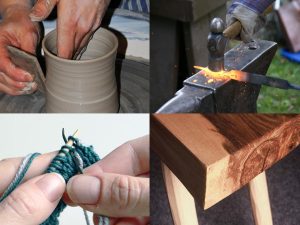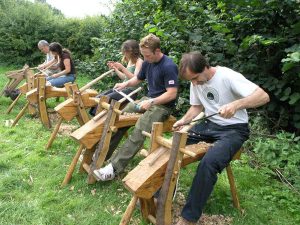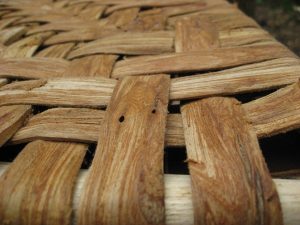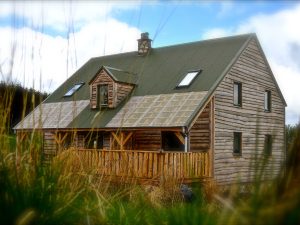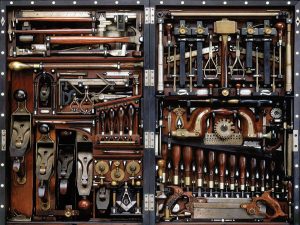We’d like to think / hope so, as climate change, environmental damage and fossil fuel depletion make huge supply chains unviable.
Most wood-turning, for the European market at least, is done in China and the Far East. But how long can this continue – the transporting of almost everything we need in the West from the other side of the world? It’s too damaging to global ecology, and it involves virtual slave labour. As climate change, fuel shortages and automation bite, and especially if and when global economies and wages begin to equalise, it might be a good idea for individuals to have gained some craft skills and for communities to have retained a range of craftspeople.
Over to Treewright, Robin Fawcett, who provides this information about a historic woodworking shop in East London – the last of its kind.
‘We are the last proper woodturners in London,’ boasts Geoff Nichols of Nichols Bros (Woodturners) Ltd in Walthamstow. It sounds like quite a bold claim, but since I have learned the story of Geoff’s family endeavour stretching back over a century, examined their work and enjoyed a tour of the premises, I am more than happy to endorse Nichols Bros as ‘proper’ woodturners indeed.
An undistinguished single storey building in a side street gives no hint of the wonders within. For eighty years, the Nichols family have been woodturning at this location and proved themselves masters of the art and the craft. Passing through double green doors from the street, you turn directly left and discover yourself in another kingdom, filled with glowing golden timber and lined with wood chips.

In a long low-ceilinged brick room sit venerable lathes surrounded by stacks of new pine and off-cuts, while the walls are adorned with intricate examples of woodturning hanging like stalactites. Geoff Nichols and his trusty partner Harry Morrow have worked here for the past half century, and they step forward to greet you – looking the epitome of master craftsmen in their long blue twill coats.
Yet further delights await your gaze. Widening his eyes in excitement, Geoff leads you into the yard beyond where blue tarpaulins conceal a unique spectacle, accumulated in a series of old sheds. One after the other, he lifts the tarpaulins to reveal rooms filled with a seemingly infinite array of spindles, all meticulously organised by style and disappearing into the gloom like gothic grottos.
‘We have a collection of in the region of three thousand different spindles,’ underestimates Geoff proudly, ‘We try to display as many as we can for ease of reference but we have lots more that are stored in boxes too.’
Unquestionably the largest collection in London and perhaps the largest collection in the world, this is – in effect – our national archive of stair spindles. It is a secret museum that tells the story of the growth of the capital in spindles – a cultural asset of the greatest significance and it will not come again. Perhaps most fascinating was the ‘London spindle’ – the most common design in the capital yet also the one with the most variants.
After half century of woodturning, Geoff Nichols needs to find someone to take on his astonishing legacy. Is there a craftworker reading this who would like to take this noble craft onwards for another fifty years and earn a lifetime’s income in the process? Is there an institution that can give a home to the largest collection of spindles in existence?

All these thoughts were buzzing in my mind as Geoff led me to the tiny cubby hole which serves as the office, where we competed over who should sit upon the only chair in the place, before I plonked myself down upon a trestle and he told me the full story of Nichols Bros.
“My dad Stanley Nichols and his brother Arthur started on this site in Walthamstow in 1949. They were two youngest out of five brothers, the two eldest – there was about a twenty year age difference – already had a woodturning business, Nichols & Nichols, in the Kingsland Rd in Shoreditch which they started before the First World War.
After Stanley and Arthur left school, they went to work for their elder brothers until the Second World War began and they went off to the forces. After the war, they carried on with their elder brothers for a year or so before they decided to set up their own woodturning business here, Nichols Bros.
I came into it the day I left school at fifteen, that was fifty years ago now in 1969, and Harry joined about four or five years after me. My Uncle Arthur retired about five years after I started, he used to handle the paperwork, so Harry took over from him. I was more involved in the practical side of the business, especially hand woodturning.
We probably had about five or six employees at our peak which was about twenty years ago. Since then the trade has changed quite dramatically because the trend has moved away from wood towards glass and metal. In pubs in the East End, all the glass racks were made of turned wood spindles but that is no longer the case. Once upon a time, we made a lot of mangle rollers but obviously that is work we will never get asked to do again. We used to do a lot of table legs and when I first joined the business all we were really doing was standard lamps.

The furniture industry disappeared in the East End a quarter of a century ago and we are now tied in to the building trade. People spend a lot of money on their properties these days, adding rooms in the loft which needs staircases – newel posts, handrails and spindles. Spindles for staircases is the work we are asked to do now, although we still make the occasional four-poster bed and table legs for the furniture trade which does exist.
A lot of woodturning is imported from China but where we do not try to compete by producing volume, we do bespoke woodturning if a customer wants spindles or newel posts matched up. Skill is very important. When I first started working here, we used to get an influx of people asking if there was a job or could they learn the trade, but it seems the younger generation tend to shy away from manual trades today.
My dad was an exceptionally good woodturner, better at some things than me although I think I am better than him at others. You can be the most skilled woodturner in the world but you have to do it within a certain time, because time is money. It is all about earning a living, it is not a hobby. If you turn one spindle by hand, you have then got to be able to replicate it again quickly. Being able to get sharp definition in your work is very important. I can look at any piece of woodturning and tell straight away whether it was made by a highly skilled turner or not.

In woodturning, the trick is you must not pick up and tools and put them down again too many times. You have to do as much as you can with either the chisel or the gouge. When you change tools you are wasting time, so you must be able to do the maximum before you change tools. That is the secret to fast woodturning and to be able to turn nice bead, a fillet or a jug. The ridge around the shaft is called a ‘bead,’ like beading. The ridge between the bead and the shaft of the spindle is called the ‘fillet’ and it gives definition of the bead. The ‘jug’ is the wave profile, like on a jug. Any woodturning you see is beads, fillets, bands, hollows and jugs. That is all woodturning is. We have a collection of in the region of three thousand different spindles. We try to display as many as we can for ease of reference but now we have lots that are in boxes too.
It gives me pleasure to take a square blank and turn it into an artistic shape. You alone know the difficulty in turning it. You can see that you have made something that looks beautiful and will be there for a long time. When you visit old buildings, you appreciate the tremendous work that was involved in the woodturning, especially since they were working on primitive lathes compared to ours.
My children will not be coming into the business. My son works in the City and my daughter has an Estate Agents, so no-one in the family can take it over which is a real shame. I would be open to train someone if they came and asked me It would be lovely if we could find someone who wanted to start a woodturning business, because over the last seventy years we have collected so many machines and tools which are irreplaceable.”
Nichols Bros (Woodturning) Ltd, 2A Milton Rd, Walthamstow, E17 4SR





